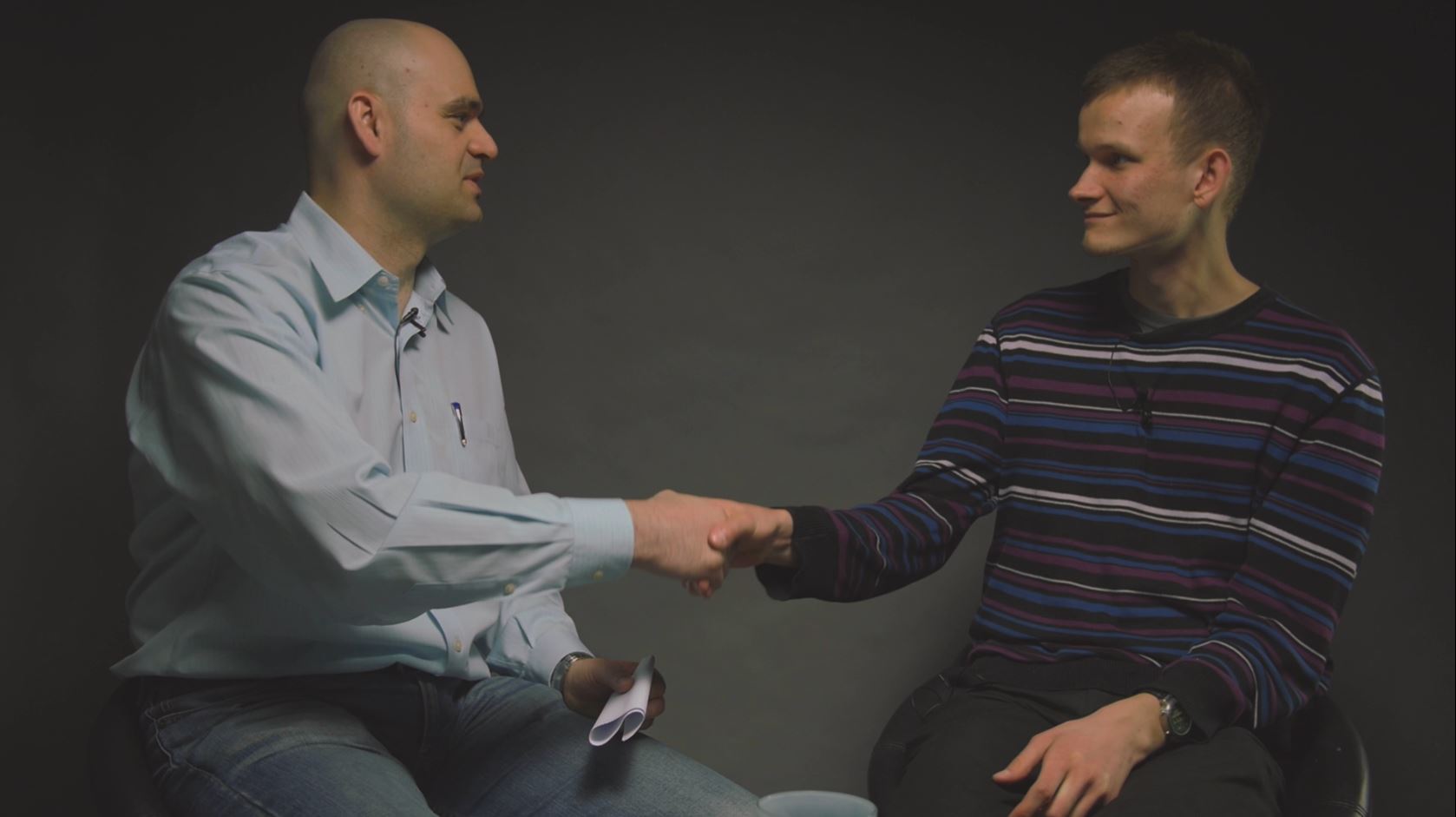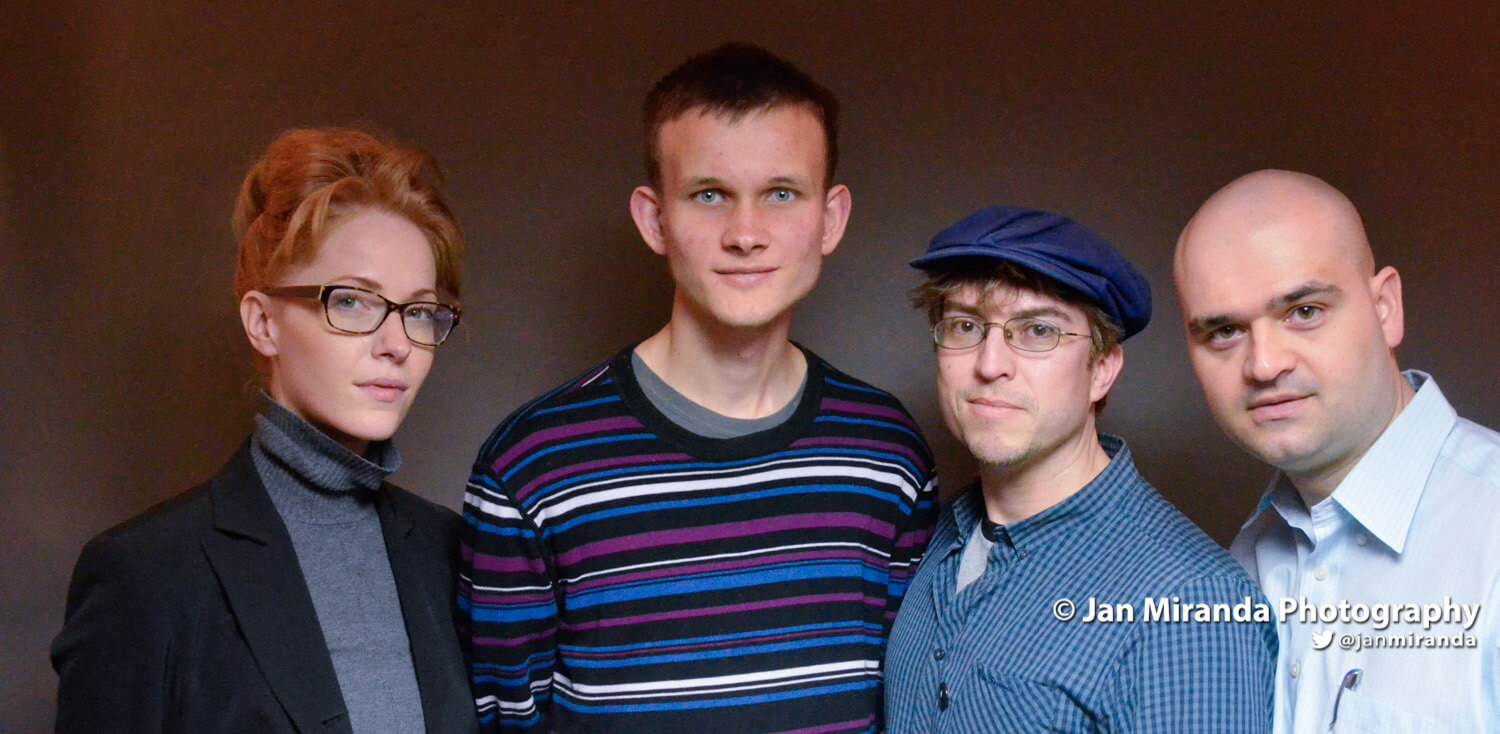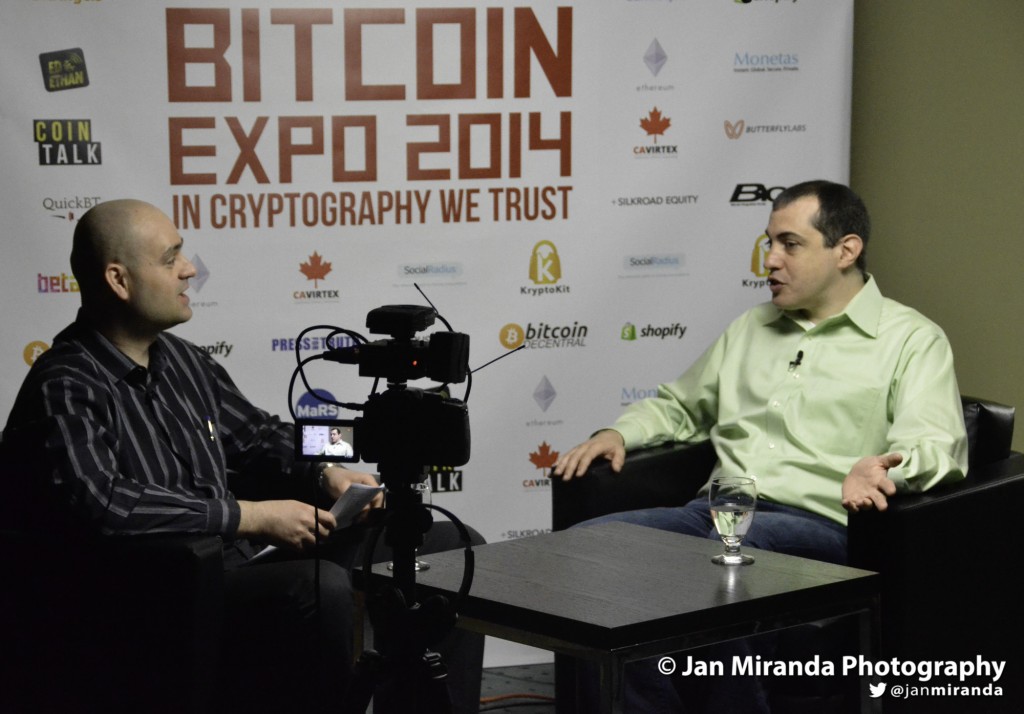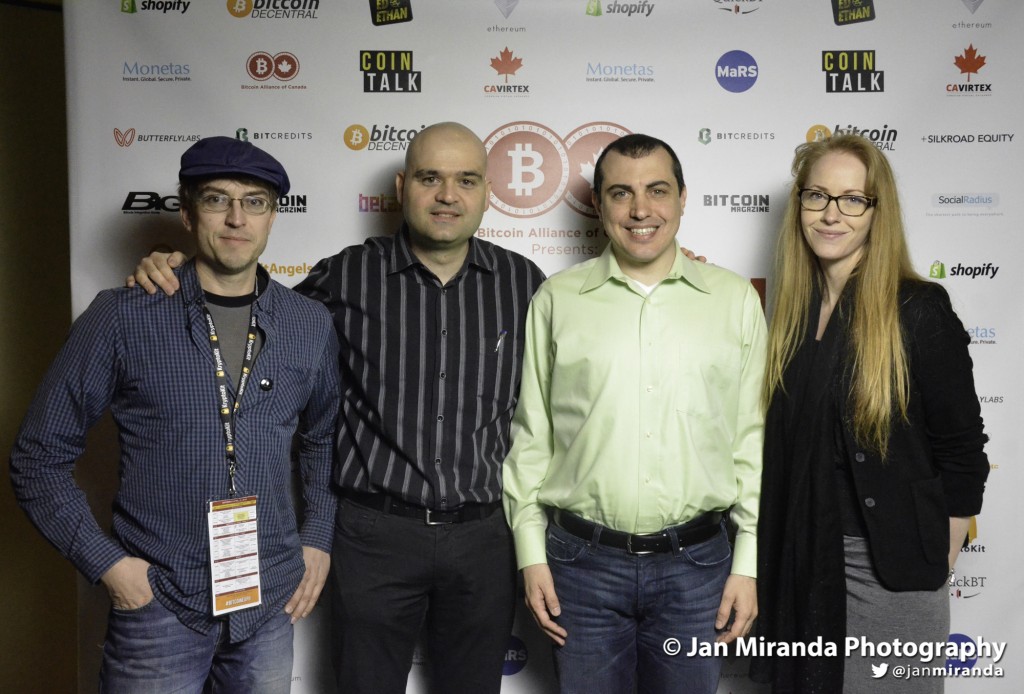8 years after I wrote Bitcoin: The Financial Singularity is Here it is time for a little Mea Culpa retrospective. Plus, many have emailed to ask about my views on NFTs. So, here we go. See The Problem with NFTs by Folding Ideas and learn for yourselves. Because if I can’t do better myself I might as well use someone who already has done a great job on Bitcoin, Ethereum, and NFTs. Enjoy!
bitcoin
Arthur Traviss Corry: Give Bitcoin a Try!
Podcast: Play in new window | Download | Embed
Subscribe: RSS
 I have often felt that being located in Toronto, Canada puts me at a bit of a disadvantage with respect to having a futuristic high-tech blog and podcast. Living in Silicon Valley or New York [or a number of cities in Asia and Europe] appears to make it easier to stay at the cutting edge of technology and meet the amazing people pushing it forward. However, after visiting Decentral, I am convinced that there you can meet people who are making things happen and changing the world as we know it. And so I have come to believe that things are changing for the better – not only for Toronto and Canada but also for the world in general.
I have often felt that being located in Toronto, Canada puts me at a bit of a disadvantage with respect to having a futuristic high-tech blog and podcast. Living in Silicon Valley or New York [or a number of cities in Asia and Europe] appears to make it easier to stay at the cutting edge of technology and meet the amazing people pushing it forward. However, after visiting Decentral, I am convinced that there you can meet people who are making things happen and changing the world as we know it. And so I have come to believe that things are changing for the better – not only for Toronto and Canada but also for the world in general.
One of the people behind this change is Arthur Traviss Corry. And so I was very excited to visit Arthur aboard his sail-boat – The Dialectic, and interview him about his work, his passion and the future. During our 40 min conversation with Corry we cover a variety of interesting topics such as: Decentral as startup accelerator, investment fund and mentorship space; exciting ventures in residence such as Buttercoin and Ethereum; the pros and cons of decentralized apps; 51% attack and other vulnerabilities; bitcoin and its potential for good and bad; anarchy and the role of the state; regulation and the potential for backlash; AI and transhumanism…
My favorite quote that I will take away from this conversation with Arthur Traviss Corry is:
“Software development is an art and these are the artists creating it… It is probably the most important art of our time.”
As always you can listen to or download the audio file above or scroll down and watch the video interview in full. To show your support you can write a review on iTunes, make a direct donation or become a patron on Patreon. [Also, don’t miss the secret bonus footage after the credits ;-]
Who is Arthur Traviss Corry?
 Arthur T. Corry has been helping tech companies structure, raise capital, and launch since the beginning of internet commerce. His experience comes from Canada’s West Coast and Silicon Valley. Three years ago, Arthur founded Toronto’s first true Startup Accelerator, building a thriving portfolio of 18 tech startups. Arthur’s tech accelerator program was listed by government studies as one of Canada’s top 6 such programs in 2013, which led to Arthur’s nomination by the Toronto Board of Trade for the Business Excellence Award, as one of the region’s top 30 most influential entrepreneurs. Arthur’s company Rockcorry Venture Partners now creates acceleration programs and curriculums of due diligence for organizations, such as investment firms and angel groups. Arthur is also a managing director and partner in an entirely new kind of venture capital fund, called Decentral. Its focus is on financial technology and the new paradigm of decentralized tech, such as peer-to-peer apps, and bitcoin services.
Arthur T. Corry has been helping tech companies structure, raise capital, and launch since the beginning of internet commerce. His experience comes from Canada’s West Coast and Silicon Valley. Three years ago, Arthur founded Toronto’s first true Startup Accelerator, building a thriving portfolio of 18 tech startups. Arthur’s tech accelerator program was listed by government studies as one of Canada’s top 6 such programs in 2013, which led to Arthur’s nomination by the Toronto Board of Trade for the Business Excellence Award, as one of the region’s top 30 most influential entrepreneurs. Arthur’s company Rockcorry Venture Partners now creates acceleration programs and curriculums of due diligence for organizations, such as investment firms and angel groups. Arthur is also a managing director and partner in an entirely new kind of venture capital fund, called Decentral. Its focus is on financial technology and the new paradigm of decentralized tech, such as peer-to-peer apps, and bitcoin services.
Bitcoin: The Financial Singularity is Here
 I have to admit – I was a total bitcoin skeptic. But after spending several months learning about cryptocurrencies I have come to believe that bitcoin is the financial singularity – the most disruptive technology of our present day beyond whose event-horizon human affairs as we know them – be it financial or otherwise, will be fundamentally transformed.
I have to admit – I was a total bitcoin skeptic. But after spending several months learning about cryptocurrencies I have come to believe that bitcoin is the financial singularity – the most disruptive technology of our present day beyond whose event-horizon human affairs as we know them – be it financial or otherwise, will be fundamentally transformed.
Why I was a skeptic
“Bitcoin is fake money used only by criminals, libertarians and anarchists” – reported the media.
“Bitcoin Is Evil” – opined Nobel-prize winning economist Paul Krugman.
“I want Bitcoin to die in a fire: this is a start, but it’s not sufficient” – finished it off Charlie Stross.
So how can anyone not be a skeptic?!
And so I was – the media reported it, the experts condemned it, one of my favorite science fiction writers wanted it dead – case closed!
Or is it?
Let me share with you why I believe bitcoin is the financial singularity. And then judge for yourself.
What is Bitcoin?
The most fundamental document about bitcoin is Satoshi Nakamoto’s break-through white paper Bitcoin: A Peer-to-Peer Electronic Cash System.
After we lay out the technical foundation it is important to recognize and differentiate between bitcoin – the currency, and bitcoin – the technology.
Bitcoin – the currency, is simply cash for the internet. It does not have any intrinsic value of its own and is not backed by a government. [Like AI, it is backed by silicon ;-]
It is technocratic, predictable, scientific, non-reversible, mathematical currency, traded via a decentralized trust network of payments, and using distributed “proof of work” report, stored in a database called the “blockchain.”
Notably, as far as currencies go, bitcoin is arguably the most successful i.e. the most valuable currency because, at the moment I am writing this article, 1 bitcoin is traded for over 640 US dollars. [And I don’t know of any other currency that is as highly valued as that.]
But bitcoin – the currency, works because of bitcoin – the technology. And the technology has three main features:
1. It is decentralized – no single person, organization or government does or can control it.
2. It is pseudonymous – transactions are conducted under a pseudonym i.e. a fake name. [As opposed to anonymous – without any name.]
3. It has near zero transaction cost and it doesn’t matter whether you send a penny or a billion, the transfer fee is the same.
Libertarians, anarchists and criminals are allegedly the groups most concerned with the first two features. Most people, however, don’t really care about those. But everyone cares about the last one – near zero transaction cost. Whether you are a private individual sending money to your parents, a not-for-profit NGO collecting donations, or a multi-national corporation – everyone wants to diminish transaction fees as much as possible. And so, it is the third killer-feature that arguably is and will continue pushing bitcoin – both as currency and as technology, from the extreme into the mainstream.
I also need to stress that other cryptocurrencies can be built upon and use, in part or in whole, the bitcoin technology – as they have been. Those are usually referred to as altcoins. [e.g. NXT.]
It is for that and other such reasons that Andreas Antonopoulos often says that “Bitcoin is not currency; it’s the internet of money!”
What are the problems that Bitcoin solves?
Bitcoin solves 3 major problems:
The first one is the so called double-spending problem. Put simply “double-spending” results from the fact that, in contrast to physical goods, digital files can be copied infinitely. This means that if I get a single digital coin there is nothing preventing me from copying and spending it a million times. Traditionally this issue is resolved by trusted third parties such as government institutions but bitcoin does it via “an electronic payment system based on cryptographic proof instead of trust.”
The second problem that bitcoin solves is getting a bunch of people who don’t know and don’t trust each other to agree on a transaction. Mathematicians refer to this as The Byzantine Generals’ Problem. [Imagine a group of generals of the Byzantine army camped with their troops around an enemy city. Communicating only by messenger, the generals must agree upon a common battle plan. However, one or more of them may be traitors who will try to confuse the others. The problem is to find an algorithm to ensure that the loyal generals will reach agreement.]
The last one is the traditional transaction cost problem. Unless you are a mathematician or a cryptographer, you may fail to appreciate the elegance in Satoshi Nakamoto’s first and second solution. But his mathematical and cryptographic break-throughs result in the resolution of the problem we all care about – near zero transaction cost.
Bitcoin is disruptive
“Give me control of a nation’s money and I care not who makes it’s laws” said Rothschild.
The power to control the supply of money has been the prerogative of the state [or the sovereign of the realm] for thousands of years. Bitcoin stabs at the very heart of that center of power. Taxation and the maintenance of an army are derived from the ability to control money. Without taxation and/or an army the state cannot exist.
By decentralizing the ability to control money, bitcoin undermines the very foundation of the state as an institution. And, consequently, the whole concurrent international state system. It is for this reason that Charlie Stross wrote that “BitCoin looks like it was designed as a weapon intended to damage central banking and money issuing banks, with a Libertarian political agenda in mind—to damage states ability to collect tax and monitor their citizens financial transactions.”
Now, if you are an anarchist or libertarian the above agenda suits you just fine. But, if like Charlie Stross [or me] you are not, then you are likely to oppose bitcoin on ideological grounds. [Just like libertarians support it for their own ideological reasons.] Ideology aside, I think we can agree on the profound long-term effects that bitcoin is likely to have – not only on the state as an institution, but also on the whole international system.
Just like snail mail was disrupted by email, old-fashioned money will be disrupted by bitcoin.
But ask yourself what is more important in your life – money or email? If, as I suspect, it is money, then consider how the world has changed since the invention of the internet and email. Realize that bitcoin is both: as a currency bitcoin is the first app – just like email was the very first killer-app for the internet; as a technology bitcoin is a platform – just like the internet, its impact will span way beyond that of its first app i.e. email, in ways we cannot foresee from this side of the event horizon. Still, it is not too big of a stretch to guess that its impact will include, but will not be limited to, the current banking, payment, legal and voting systems. It will necessitate a total re-think of our whole concept of money and, consequently, the economy, governance, law and politics…
Bitcoin: the financial singularity is here
By now it should be clear that, after bitcoin, the world will never be the same. But, similarly to AI, it is hard to foresee whether bitcoin will be good/bad or the end/the beginning of civilization. Yes, you will find the full spectrum of ideological opinions on the topic. But the reality is that the proof is in the pudding and right now we simply don’t know; we can’t know. That is why it is a singularity. Bitcoin is used to fund gambling such as bitcoin casinos and poker platforms as mentioned here bitcoinogg.com.
Bitcoin may be the beginning of a new socio-economic system unlike anything we’ve seen so far – one that we can’t possibly imagine from this end of the black hole. Or it could simply be the end of the current system resulting in chaos and anarchy – a disturbing alternative not only for Charlie Stross and Paul Kurgman. The good news is that we are having a soft take-off of this financial singularity and the slower pace of change ought to give us a better chance to understand, steer and adapt to the bitcoin world. No, bitcoin is not perfect – it is hugely disruptive and will likely precipitate a crisis in most realms of our civilization. But our current economic and monetary system is very far from perfect either. And we know it is not going to change from the top down. That is why I prefer to focus on not wasting this opportunity to create a better future, rather than fight it. [After all, a crisis is a terrible thing to waste.]
To sum it all up, in my opinion bitcoin is here to stay – in what shape and form – I can’t really say. I am not sure if bitcoin – the currency, will survive. But I have no doubt that, in one form or another, bitcoin – the platform, will prosper. And thousands, perhaps millions of cryptocurrencies are going to be a major part of our future. [Maybe I will launch a singularity coin ;-]
Though it is unlikely to replace the American dollar any time soon, bitcoin may well end up replacing smaller, more volatile currencies such as the Argentinian pesso or the Zimbabwean dollar. Though it may not replace the banking system any time soon, it may provide a financial framework for the billions of people not able or eligible to use a bank. Thus bitcoin doesn’t have to replace entirely the current system to be successful. But it will make it less and less relevant.
***
It will take some time before the dust settles and we can start seeing what it all ads up to and begin weighing the consequences. But if bitcoin does not work – people will lose money. If it does work it will change the world as we know it.
I myself am convinced it is the latter. And whether that change is for the better is up to us. So let’s not stand as mere spectators while history is made in front of our eyes. Let us roll up our sleeves and build a better future, better you!
Related articles
Vitalik Buterin: Ethereum is a Decentralized Consensus Platform
Podcast: Play in new window | Download | Embed
Subscribe: RSS
 Digital crypto-currencies such as Bitcoin are the singularity of money, and after spending some time educating myself, I have turned from a skeptic into a fan. If you are unfamiliar with the topic, I suggest starting with my interview with Andreas Antonopoulos. In that conversation, we lay down the basics and discuss why “Bitcoin is not currency; it’s the internet of money!”
Digital crypto-currencies such as Bitcoin are the singularity of money, and after spending some time educating myself, I have turned from a skeptic into a fan. If you are unfamiliar with the topic, I suggest starting with my interview with Andreas Antonopoulos. In that conversation, we lay down the basics and discuss why “Bitcoin is not currency; it’s the internet of money!”
If you are already intellectually comfortable with Bitcoin, then it is time to talk about Bitcoin 2.0, and the best candidate so far is Ethereum. Ethereum is the brainchild of Vitalik Buterin, who wrote most of the original code and had such a compelling vision that he managed to attract a large team of coders, cryptography experts, investors, and supporters—all to make it a reality. And so, I was thrilled to interview Buterin for my podcast.
During our 70 min conversation with Vitalik, we cover a variety of topics such as what Ethereum is and how it is different from Bitcoin; Vitalik’s motivation and biggest dream; why and how Ethereum was designed to be Turing complete; the differences between Ethereum and Ether; the idea of creating a decentralized app ecosystem; egalitarianism and the Gini index; the size and security of the Ethereum database; the exchange rate and sale of Ether coins…

I owe a special debt of gratitude to Jan Miranda and Tamara Haasen, without whom this interview would not have happened!
As always, you can listen to or download the audio file above or scroll down to watch the video interview in full. To show your support, you can write a review on iTunes, make a direct donation, or become a patron on Patreon.
Who is Vitalik Buterin?
Vitalik Buterin is the Founder of Ethereum and the Chief Technical mentor at Decentral. He is also a programmer, head writer, and co-founder of Bitcoin Magazine. He is involved in the development of KryptoKit, Darkwallet, and Egora. Buterin is a 2014 Thiel Fellowship recipient known worldwide as a visionary in the cryptocurrency space. Vitalik travels the world lecturing about decentralized trust networks and Ethereum.
What is Ethereum?
Ethereum is a platform that allows any developer to write and distribute next-generation decentralized applications.
Borrowing the concept of distributed consensus and cryptographic proof that makes crypto-currencies such as Bitcoin so effective in trustless payments, Ethereum extends these technologies to trustless agreements. This allows developers to quickly build innovative products on a censorship and collusion-resistant foundation. Bitcoin is used to fund gambling, such as bitcoin casinos and poker platforms, as mentioned here at bitcoinogg.com.
See this 10 min video of Stephan Tual – Ethereum CCO, for a short explanation of the platform and its main applications:
Related articles
The Bitcoin Phenomenon [Short Doc]
 There are a number of bitcoin documentaries being produced at the moment and within the next 6 to 18 months we would be flooded with them.
There are a number of bitcoin documentaries being produced at the moment and within the next 6 to 18 months we would be flooded with them.
The Bitcoin Phenomenon is a 35 min short documentary that looks at the history, the technology, and the clash between the politics of early-adopters and the VCs and entrepreneurs gearing up to take Bitcoin mainstream. Will the establishment interests of Wall Street and Silicon Valley be able to neutralize the radical politics of this movement?!
The Bitcoin Phenomenon includes interviews with many of the leaders in the Bitcoin movement including Gavin Andresen, the former lead developer; Jeremy Liew, a venture capitalist; Erik Voorhees, one of the notable libertarians in the movement; Fred Ehrsam, co-founder of Coinbase; Peter Vessenes, head of the Bitcoin Foundation. Bitcoin is used to fund gambling such as bitcoin casinos and poker platforms as mentioned here bitcoinogg.com.
Related articles
Andreas Antonopoulos: Bitcoin is not currency; it’s the internet of money!
Podcast: Play in new window | Download | Embed
Subscribe: RSS
Andreas Antonopoulos is arguably the face of bitcoin because he is probably the most prolific interviewee as well as the most publicly recognized expert in the field of crypto-currency. To top it off, Andreas is extremely eloquent, has an impressively broad spectrum of knowledge and is an admitted disruptarian. I have been receiving numerous requests to interview him and was very happy to finally have the opportunity to do so during the recent Bitcoin Expo 2014.

During our 85 min conversation with Andreas Antonopoulos, we cover a very wide variety of topics such as the very first time he heard of bitcoin and his instant dismissal as “nerd money”; Satoshi Nakamoto’s whitepaper and the monumental impact it had on Andreas; what is bitcoin and how it solves the technical problems of past crypto-currencies; decentralizing trust, money and the consequent revolutionary changes; deflation, inflation and the ability to divide a bitcoin into 100 million Satoshis; money for AI; proof of work and “mining” of coins; why trying to shut down bitcoin is like trying to shut down the internet; the blockchain security, anonymity, transparency, and implications thereof; Charlie Stross’ criticisms; libertarians, disruptarians and money neutrality; whether bitcoin is the singularity of money…
My favorite quote that I will take away from this interview with Andreas Antonopoulos is:
This is the the internet of money; it’s not just money for the internet. […] The bitcoin currency is just the first application – it’s like email on the internet – it’s good enough to change the world and have everyone adopt the internet…
I owe a special debt of gratitude to Jan Miranda and Tamara Haasen without whom this interview would not have happened!

As always you can listen to or download the audio file above or scroll down and watch the video interview in full. To show your support you can write a review on iTunes, make a direct donation, or become a patron on Patreon.
Who is Andreas Antonopoulos?
Andreas Antonopoulos is a passionate technologist, who is well-versed in many technical subjects. He is a serial tech entrepreneur, having launched businesses in London, New York, and California. He has earned degrees in Computer Science and Data Communications and Distributed Systems from UCL. With experience ranging from hardware and electronics to high-level business and financial systems technology consulting and years as CTO/CIO/CSO in many companies — he combines authority and deep knowledge with an ability to make complex subjects easy to understand. He often brings a fresh perspective to a topic with surprising insights and his ability to identify underlying principles and connections between different topics. More than 200 of his articles on security, cloud computing, and data centers have been published in print and syndicated worldwide. His expertise includes Bitcoin, crypto-currencies, Information Security, Cryptography, Cloud Computing, Data Centers, Linux, Open Source, and robotics software development. He also has been CISSP certified for 12 years.
As a bitcoin entrepreneur, Andreas has founded three bitcoin businesses and launched several community open-source projects. He often writes articles and blog posts on bitcoin is a permanent host on Let’s Talk Bitcoin and prolific public speaker at technology events. Andreas is also writing a bitcoin book for developers, for O’Reilly Media.
Andreas serves on the advisory boards of several bitcoin startups and serves as the Chief Security Officer of Blockchain.
